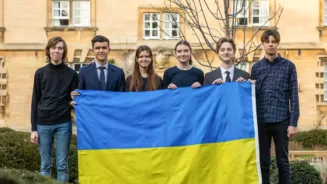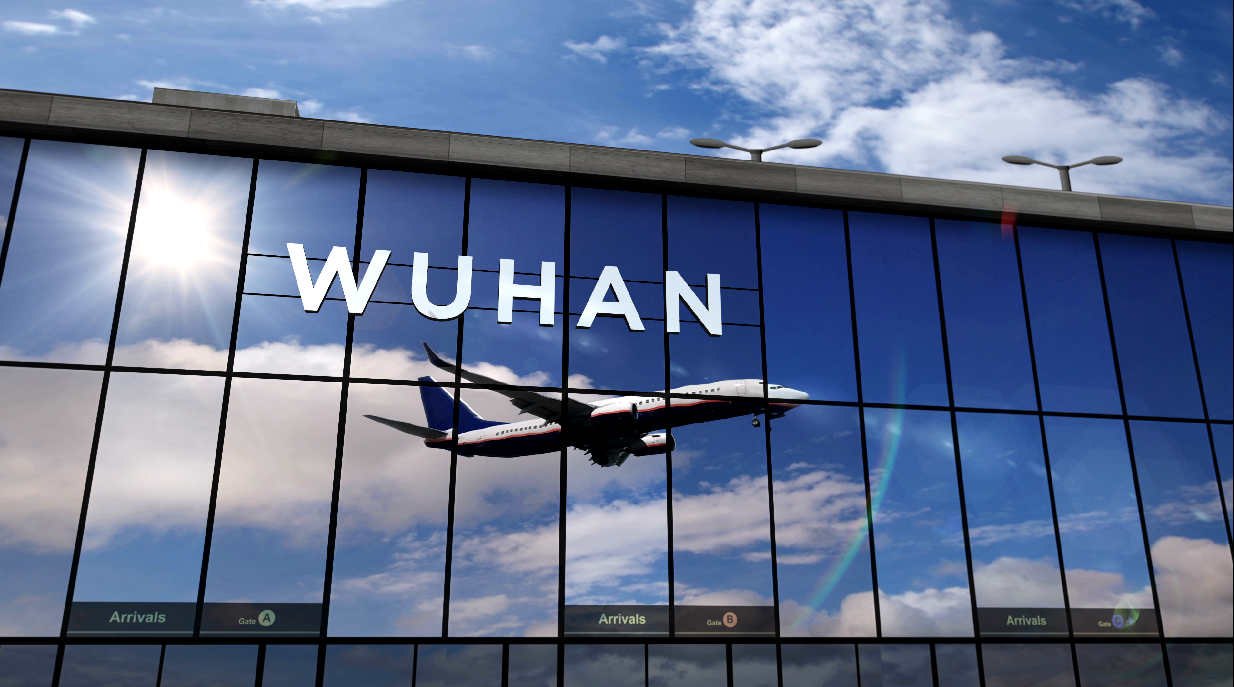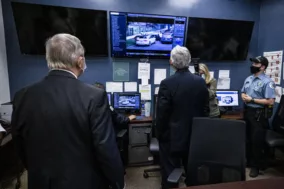Helping Communities in Need

- Through support from Ken Griffin's Ukraine Math and Science Achievement Fund, exceptionally gifted Ukrainian high school mathematicians and computer scientists displaced by the war in their home country are able to continue pursuing their education at the world’s top universities.
- Swiftly responding during the COVID-19 pandemic, Ken Griffin and his Citadel colleagues assisted the State Department to safely repatriate 800 Americans stranded in Wuhan, China. They also mobilized efforts to provide critical shipments of food, supplies, and oxygen, addressing needs in the US and abroad.
- With a focus on future preparedness, Griffin Catalyst funded a first-of-its-kind, public-private partnership for unified disaster preparedness and resilience strategy in Miami.
Ukrainian students – including some of the brightest of their generation – have faced unimaginable hardship and have had their education and futures disrupted. The Ukraine Math and Science Achievement Fund aims to ensure that these brilliant students have the opportunity to realize their academic ambitions and leave their mark on the world.
Few crises in recent decades have been as devastating as the war in Ukraine, which began when Russian forces launched a large-scale attack on their Eastern European neighbor in the overnight, hours of February 24, 2022.
The human consequences of the war have been wide-ranging, and in some cases unimaginable, but one particular impact caught the eye of an associate professor of computer science at the University of Cambridge, Dr. Ferenc Huszár.
For years, Huszár has worked with students from Eastern Europe who participate in competitions like the International Math Olympiad, a series of global competitions for the world’s most gifted high school mathematicians, in which Ukraine has a proud tradition. In the weeks following the invasion, Huszár began to wonder what was happening to those talented Ukrainian students whose lives had been upended by war.
As he reached out to students in the Olympiad community, Huszár learned about the harrowing experiences these brilliant young men and women were enduring. One of the most accomplished students, an 18-year-old named Ihor Pylaiev, had been living with his family in the outskirts of Kharkiv when he was awakened one morning by the ear-splitting sound of dropping bombs.
Hiding in his apartment as nearby explosions shattered the building’s windows and the clatter of gunfire grew closer, he and his family soon moved closer to the city’s center for temporary safety. After hurriedly packing, he managed to escape Ukraine, only to become a refugee in Italy—a country where he had no friends, whose language he did not speak, and where he would find it difficult to access the specialized advanced education he needed.
It suddenly clicked that some of these Olympiad-winning, amazing students I’m writing about are the same people I see in the news who are refugees or having to leave their countries. Once I made that connection, I immediately started this project.
Higher education for Ukraine’s brightest students
Moved by the Ukrainian students’ plight—and afraid that a generation of the world’s most gifted young minds would fall victim to the uncertainties of war—Huszár and a few dedicated colleagues used their own funds to provide whatever help they could, including purchasing laptops for the refugee students. But as weeks of war turned to months, the students’ needs exceeded what this dedicated group was able to provide, so Huszár and his colleagues went in search of additional funding.
At Griffin Catalyst, they found a receptive ear, and the Ukraine Math and Science Achievement Fund was born. Funded by an initial $3 million gift from Ken Griffin and administered by the Digital Harbor Foundation in Baltimore, the fund is providing tuition and other support to help talented Ukrainian students impacted by the war pursue STEM studies at top schools around the world.
The program launched with seven students—four men, three women, and all of them Olympiad medalists. In the coming years, the initiative will expand to include many dozens of students attending top educational institutions in the United States, Europe, and Asia.
As for Ihor Pylaiev, he is now attending Cambridge University with support from Griffin Catalyst, and in July 2022 was able to enter the International Math Olympiad in Oslo—where he triumphed as the overall global winner and the first Ukrainian student in memory to achieve a perfect score in the competition.
Everything has changed. Different country, different language, different culture. What has stayed the same is math—it is still the center of gravity for me.

“Very Fast and Very Effective”
In February 2020, when COVID-19 still remained a remote threat for many Americans, Ken Griffin learned that one of his Citadel colleagues and her family were unable to leave Wuhan—the city where the outbreak had begun—as the Chinese government moved to lock the city down. Upon reaching out to then-U.S. Secretary of State Mike Pompeo for advice, Griffin learned that hundreds of other Americans were in the same predicament.
With confusion and anxiety about the virus growing through much of the world, international travel shutting down almost overnight and the Chinese government starting to close Wuhan, it seemed impossible to bring back the hundreds of Americans who remained. Indeed, at that moment only a single commercial flight was scheduled to leave the city—far from what was needed to bring the remaining Americans home.

800
Americans safely repatriated from Wuhan, China at the start of COVID-19 in 2020
Goodness knows how long it was going to take to get them out. We didn’t want our team locked in there. We wanted to make sure we helped Americans—any Americans—to get out.
As Pompeo later recalled, Griffin’s response was swift. “Ken said, ‘I have some resources. I have access to some airplanes.’ And that began a conversation that was very fast and very effective.”
Working out a plan with State Department officials, Griffin and his colleagues quietly funded four passenger aircrafts, secured qualified pilots and crew, and made the necessary public health, quarantine, and security arrangements to bring Americans home. Within a few days, the team safely transported 800 people back to the United States—the entire diplomatic staff as well as hundreds of other American citizens.
Impacts Near and Far
But the COVID-19 pandemic was only beginning, and Griffin Catalyst’s efforts soon turned closer to home.
By March 2020, it was becoming clear that widespread job loss due to impending lockdowns—and the impact of COVID-19 itself—would likely threaten the ability of hundreds of thousands of families in cities like Chicago to put meals on the table. And with the city’s public schools closed, hundreds of thousands of children would no longer be able to count on school breakfast or lunch.

Griffin Catalyst sprang into action, mobilizing $2.5 million to help Chicago’s public schools and the Greater Chicago Food Depository address the crisis of food insecurity in the city. Part of the funding helped establish food distribution sites at more than 350 Chicago schools, providing the city’s 355,000 students and their families regular access to food in their neighborhoods. Additional support enabled the expansion of a citywide emergency food distribution plan, providing 4.5 million meals to Chicagoans most at risk.
Quickly ramping up operations, the Food Depository produced thousands of prepackaged boxes of groceries, allowing food pantries and mobile distributions to serve large numbers of people, even while practicing social distancing.
4.5 Million+
Meals provided to Chicago families facing food insecurity during the COVID-19 pandemic
Ken and others are exhibiting extraordinary civic leadership at its finest.
As the pandemic wore on—and months stretched into years—new problems began to arise, not only in the United States but all around the globe. In May 2021, more than a year after the initial outbreak, an especially devastating wave of infections hit India. In the space of just three weeks, the world’s second-largest country recorded seven million new coronavirus infections, a third of the total number it had recorded since the start. The situation was only growing worse, with one public health model predicting more than one million deaths in the next three months.

Across India, hospitals and clinics were running desperately short on respiratory-care equipment, and oxygen generation plants couldn’t keep up with the demand. Griffin Catalyst joined forces with the Bill & Melinda Gates Foundation to commit $5.5 million to an effort carried out by global public health organization PATH. While coordinating with state governments across India to answer the immediate oxygen shortage, PATH also provided the technical expertise needed to set up oxygen-generating plants around the country. In addition to meeting the most critical, immediate need, the effort created infrastructure intended to benefit the Indian people long after the crisis had passed.
Lack of access to medical oxygen is one of the defining health challenges of our age. We must come together with others to help address this important issue.
All told, Griffin Catalyst committed well over $50 million to address some of the most urgent problems brought on by the COVID-19 pandemic, providing supplies and humanitarian aid, increasing internet access and educational resources for students during remote learning, accelerating testing and treatment and advancing the scientific research that would lead to a vaccine against the virus itself.
20,000
Reusable oxygen cylinders delivered across rural India by PATH partner OxygenForIndia
Disaster Preparedness, Relief, and Resilience
In the early hours of June 24, 2021, Champlain Towers South, a condominium tower in the Miami suburb of Surfside, suddenly collapsed due to structural failure, killing 98 residents inside. Another 126 residents survived the collapse, though many lost family members and neighbors—and all had lost their homes.
The local community sprang into action to support victims but was starting from scratch in the wake of the unanticipated catastrophe. Through that experience, city officials and civic leaders came to realize that Miami and the surrounding area needed a unified, well-organized strategy for disaster preparedness, relief, and resilience.
I made myself a promise at that moment that we’d never again be in the middle of an active crisis starting from zero.

With a $5 million leadership gift, Griffin Catalyst stepped in to fund among the nation’s first municipal public-private partnerships for a unified disaster preparedness and resiliency strategy.
Designed to support communities from preparedness through victim support, the Miami Disaster Resilience Fund begins with pre-disaster stabilization grants: funds on reserve to deploy to frontline organizations in advance of an impending disaster, such as a hurricane. It covers crisis support, providing resources immediately to pre-vetted and coordinated organizations, with clear communication pathways to speed up delivery in an active crisis. It moves on to post-disaster recovery grants: funds readily available for long-term recovery. Finally, it deploys preparedness grants so that the region—and those working to make the community more resilient—are ready to respond to the next disaster, whenever it may strike.
This evergreen fund will build capacity for local nonprofits working to prepare the most vulnerable communities, and to expedite a response for the community in times of need.
15,000
Disaster kits created in the first six months by the Miami Disaster Resilience Fund to enhance Miami’s hurricane preparedness





